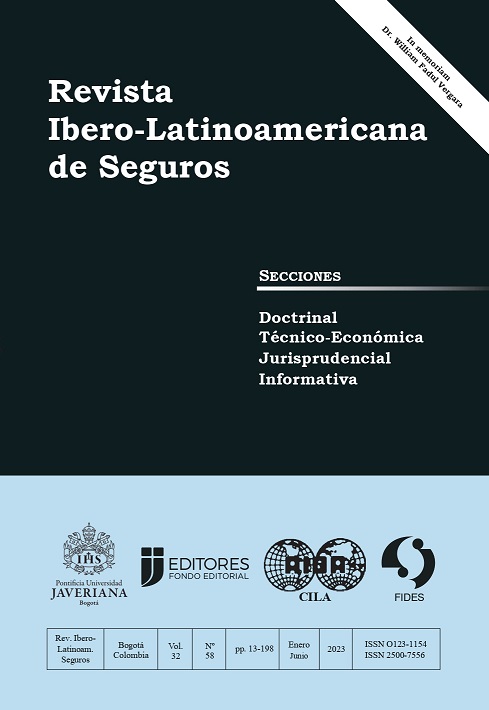Abstract
The insurance market in Mexico faces a risk problem caused by the adverse selection that exists in the insurance contracting process by clients to insurers, mainly due to the concealment of private information that is not shared with the institutions. In this research we model the results of the implementation of an information portfolio of the insured regarding his previous policies before the insurers that are in the process of calculating premiums. In addition, we consider that customers can exercise their right to information, so they may or may not allow said information to be accessed by the insurer. Our model suggests that the implementation of this type of measure can reduce the problem of adverse selection in the contracting process, reduce the number of insurance frauds, and reduce the risk in the Mexican insurance market.
Brooks. 2003. Vulnerability, risk and adaptation: A conceptual framework. Norwich: Tyndall Centre for Climate Change Research.
Cámara de Diputados del H. Congreso de la Unión. 2013. Ley sobre el contrato de seguro. México D.F: Diario Oficial de la Federación.
Cano. 2009. “Los contratos, las asimetrías de la información en salud, el riesgo moral y la selección adversa.” Revista Escuela de Administración de Negocios, 5–19.
Comisión Nacional de Seguros y Fianzas. 2021. Gobierno de México. https://www.cnsf.gob.mx/Difusion/Paginas/RevistaActualidadSegurosFianzas.aspx
Deloitte. 2021. Encuesta sector asegurador. Madrid: Deloitte.
García. 2016. La selección adversa y los mecanismos para corregirla. Elche: Universidad Miguel Hernández.
Georgetown University. 2006. Base de Datos Políticos de las Américas. https://pdba.georgetown.edu/Comp/Derechos/propiedad.html
Gollier. 2003. “To Insure or Not to Insure?: An Insurance Puzzle.” The Geneva Papers on Risk and Insurance Theory, 5–24.
Herrera. 2016. Observatorio Seguros México. Ciudad de México: BBVA Research.
Insurance Information Institute. 2010. Insurance Handbook A guide to insurance: what it does and how it works. New York: Insurance Information Institute.
Lacan. 1984. Seminario III. Ciudad de México: Fondo de Cultura Económica.
Mercawise. 2018. Mercawise. https://www.mercawise.com/estudios-de-mercado-enmexico/estudio-de-mercado-acercade-seguros
Walraven. 2008. “Ingormation-problem solving: A review of problems students encounter and instructional solutions.” Computers in Human Behavior, 623–648.
This journal is registered under a Creative Commons Attribution 4.0 International Public License. Thus, this work may be reproduced, distributed, and publicly shared in digital format, as long as the names of the authors and Pontificia Universidad Javeriana are acknowledged. Others are allowed to quote, adapt, transform, auto-archive, republish, and create based on this material, for any purpose (even commercial ones), provided the authorship is duly acknowledged, a link to the original work is provided, and it is specified if changes have been made. Pontificia Universidad Javeriana does not hold the rights of published works and the authors are solely responsible for the contents of their works; they keep the moral, intellectual, privacy, and publicity rights.
Approving the intervention of the work (review, copy-editing, translation, layout) and the following outreach, are granted through an use license and not through an assignment of rights. This means the journal and Pontificia Universidad Javeriana cannot be held responsible for any ethical malpractice by the authors. As a consequence of the protection granted by the use license, the journal is not required to publish recantations or modify information already published, unless the errata stems from the editorial management process. Publishing contents in this journal does not generate royalties for contributors.


